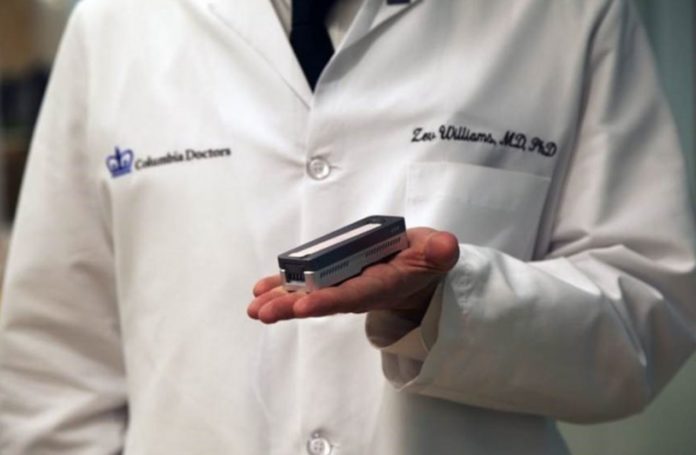A new prenatal test called STORK (Short-read Transpore Rapid Karyotyping) can detect chromosomal abnormalities and deliver the results within two Hours.
A new prenatal test developed by Columbia University Fertility Center researchers can assess if a fetus or embryo has the correct number of chromosomes in a fraction of the time and expense of currently available clinical genetic tests.
Prenatal genetic testing are currently available, but they are expensive and take days to weeks to complete; this adds to the emotional and financial strain of fertility treatment and pregnancy and affects treatment options.
The new test, known as STORK (Short-read Transpore Rapid Karyotyping), may be utilized at the point of care in the doctor’s office, provides results in under two hours, and is approximately ten times less costly to process per sample than current tests.
The New England Journal of Medicine published information regarding the performance of the test, which is pending approval from the New York State Department of Health before being provided to Columbia patients.
According to study leader Zev Williams, “We are developing the most cutting-edge technologies to solve some of the most ancient of afflictions—infertility and pregnancy loss. Our hope is that this test will help improve women’s health, lower costs, and improve access to treatment.”
The most frequent causes of miscarriage, morphological abnormalities, and developmental delays are by far the chromosomal abnormalities that this test can identify. Pregnant women who are 35 years of age or older, have a family history of genetic diseases, or have experienced one or more miscarriages are advised to undergo prenatal genetic testing. Embryos are increasingly being tested before implantation during in vitro fertilization (IVF) to increase the likelihood of pregnancy and lower the possibility of miscarriage.
The new test uses samples from a biopsy of the placenta or an IVF embryo to check for the presence of a normal number of chromosomes, just like existing prenatal genetic testing. The time and money involved in the existing tests, however, are increased since samples collected at a doctor’s office must be sent to a specialist lab that either grows cells in a dish or employs pricey technology to examine DNA.
What makes STORK so interesting, according to Williams, is that it can be used to quickly evaluate the chromosomal health of various types of reproductive tissue. “For those patients who are trying to get pregnant through IVF, the test gives the ability to conceive sooner. For those who are already pregnant, it gives more time to make important family-planning decisions. For those who have had a miscarriage, it can show why the loss happened so that steps can be taken to prevent future pregnancy losses.”
Using the newest technology
In a method developed by Williams and his team, nanopore-based sequencing technology is used to evaluate minuscule DNA fragments 15,000 times faster than conventional chromosomal testing methods, thereby drastically lowering the time required to obtain findings.
A harmonica-sized piece of equipment, weighing only 450 grams, is also used in the test, making it suitable for usage in doctor’s offices.
The results of the test
218 blinded samples from miscarriages, pregnancies (using amniotic fluid or chorionic villi—tiny growths in the placenta), and embryo biopsy samples were used to evaluate STORK. The results were compared to those from normal clinical tests. All of the results from STORK tests on samples related to pregnancy and 98% of the results from tests on embryos were the same as those from standard clinical tests. In the 10 instances when the two tests disagreed, it was found that STORK was more accurate than normal testing and had properly identified the chromosome numbers.
At a qualified independent laboratory, 60 more pregnancy samples were analyzed using STORK, and the outcomes were consistent with those of conventional clinical testing.
IVF applications and miscarriage statistics
The cost of fertility therapy increases by thousands of dollars when IVF embryos, which are generally biopsied for chromosomal testing on day five or six, are frozen for weeks before being transplanted to a woman’s uterus. With quick diagnostics, freezing might not be necessary because healthy embryos could be transferred right away.
The cost-effectiveness of this test also eliminates the need for those who have experienced a miscarriage to wait until a second or third loss before insurance will pay for pricey lab testing, which leaves many women in the dark and sometimes blaming themselves, according to Williams. “Our study also shows that our rapid test was better than the gold standard for testing miscarriage samples, giving women who have suffered a pregnancy loss a sense of closure and the ability to take steps to prevent another loss.”
Image Credit: COLUMBIA UNIVERSITY IRVING MEDICAL CENTER
You were reading: New Prenatal Test Can Tell You If You’ve Abnormal IVF Embryos Within Two Hours
